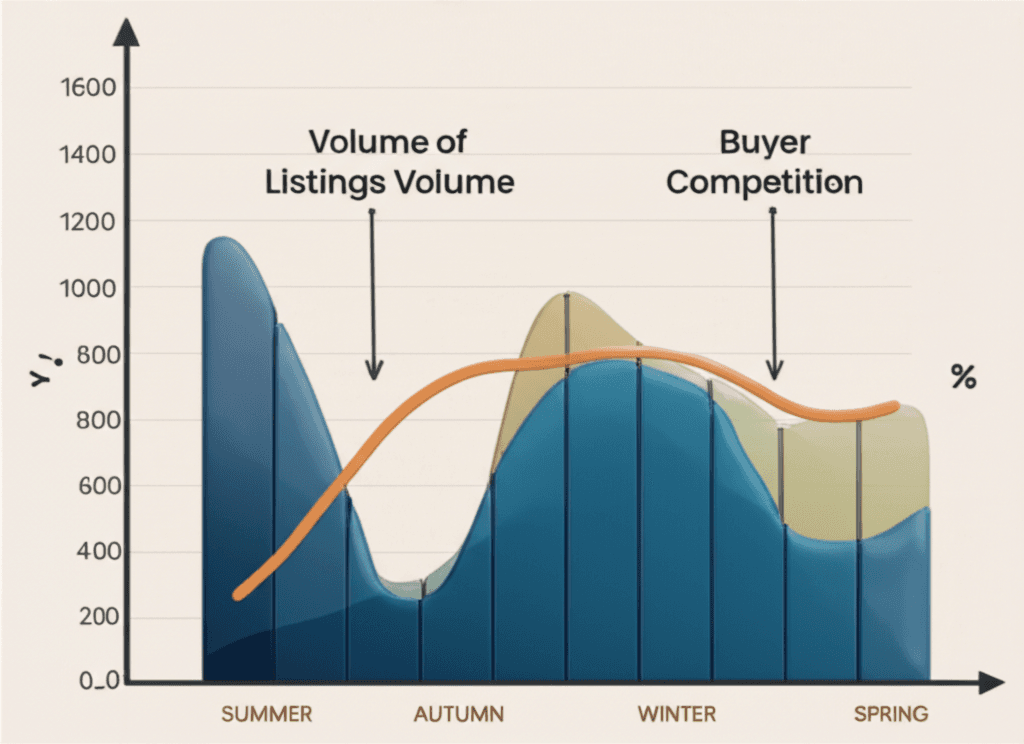Is There a Perfect Time to Buy Property in Australia?
Discover how market seasons, data insights, and personal readiness influence the best time to purchase your next home.

Navigating the Australian property market in mid-2025 can feel overwhelming. Buyers are constantly asking: 'Should I wait for the spring selling season? Will interest rates drop? Is now a good time to buy?' The endless stream of conflicting advice can lead to analysis paralysis, leaving you stuck on the sidelines while life moves on.
The truth is, the 'perfect' time to buy is a complex interplay between market dynamics and your personal circumstances. This guide will cut through the noise, breaking down the seasonal myths, market conditions, and personal factors you need to consider to make a confident and strategic property decision.
The Myth of the Perfect Season: Decoding Market Rhythms
For decades, Australian real estate has revolved around the idea of a 'spring selling season.' It's traditionally seen as the optimal time to transact, but is that still the case? While seasonal patterns do exist, the best time for you might not align with the crowds.
Spring (September - November)
Spring is undeniably the busiest period. The warmer weather brings more properties to the market, creating a vibrant, energetic atmosphere. For buyers, this means one key advantage: choice. If you're looking for a specific type of property, you're more likely to find it during spring.
However, this abundance comes with a significant drawback: competition. With more buyers actively searching, you'll likely face more bidding wars at auctions and stronger competition for private sales, potentially driving prices up.
Autumn (March - May)
Autumn is often considered a 'sweet spot' for buyers. The market is typically calmer than the spring frenzy, with a steady flow of listings. Many of these properties might be an overflow from vendors who didn't sell during the spring or summer period, making them more motivated to negotiate. With fewer active buyers, you may find yourself in a stronger position to secure a deal.
Winter (June - August)
Winter is traditionally the quietest season. Fewer properties are listed, and fewer buyers are braving the cold to attend inspections. While the limited stock can be a challenge, the reduced competition is a major plus. Motivated sellers who list in winter often need to sell, giving savvy, well-prepared buyers significant negotiation power.
Summer (December - February)
Summer can be a mixed bag. While many people are on holiday, data shows that buyer search activity remains surprisingly high, especially in January. It's a time of 'new year, new home' resolutions. Listings that linger on the market over the holiday period can present an opportunity, as vendors may be eager to sell before the autumn season kicks off. Data from early 2025 showed that January had the highest volume of new listings in seven years, offering more choice than buyers expected.
Ultimately, while seasons influence the market's pace, powerful real estate analytics show that serious buyers are searching year-round. The market doesn't truly sleep, apart from a brief dip around Christmas.

Personal Readiness: The Most Important Factor
Market timing is secondary to your personal and financial readiness. Life events are the real drivers of property transactions. People buy and sell because of major life changes, not because the calendar flips to a new season. The five most common triggers are:
Financial Gain or Loss: A change in financial circumstances.
Relocation: Moving for a new job or lifestyle change.
Marriage or Partnership: Combining households or starting a family.
Family Growth: Needing more space for children.
Death or Separation: Needing to divide or sell assets.
These events happen every day, regardless of interest rates or market sentiment. The key is to be prepared. When your life signals it's time to move, you need to have your finances in order, understand your borrowing capacity, and be ready to act.
Understanding Market Conditions: Hot vs. Cold Markets
Beyond seasons, the broader economic climate creates 'hot' and 'cold' markets. Understanding which one you're in is crucial for setting your strategy.
What is a Hot Market?
A hot market, or a 'seller's market,' is characterized by high buyer confidence, strong competition, and rising prices. This is often fueled by low interest rates and a positive economic outlook. While it's an exciting time to be a buyer because of the high volume of available properties—like a candy shop of real estate—you must be prepared for fierce competition and the possibility of paying a premium.
What is a Cold Market?
A cold market, or a 'buyer's market,' is defined by low confidence, less competition, and stable or falling prices. This can be caused by factors like rising interest rates or economic uncertainty. While there may be fewer properties to choose from, a cold market hands significant power to the buyer. Properties tend to stay on the market longer, and vendors are often more willing to negotiate on price and terms. If you are a cash-ready buyer with pre-approved finance, a cold market can be the perfect time to strike a favorable deal.
Monitoring key economic indicators, such as interest rate decisions from the Reserve Bank of Australia (RBA), can provide valuable context on market direction.
The Modern Buyer's Dilemma: Navigating the Endless Checklist
In today's market, the property search process is taking longer than ever. A key reason is the tension between a buyer's extensive 'shopping list' and their budget. Affordability constraints are pushing buyers to search in wider areas, but they are often unwilling to compromise on their non-negotiables.
This has led to a shift from 'FOMO' (Fear of Missing Out) to 'FOBO' (Fear of a Better Option). Buyers are more cautious, waiting to see if a more suitable property will come onto the market next week or next month.
Defining Your Non-Negotiables
Different buyer demographics have vastly different priorities:
First-Home Buyers: Prioritize lifestyle and convenience. Proximity to public transport, cafes, and local amenities is often at the top of their list. They are typically more flexible on property features if the location is right.
Upgraders: This group has the longest and most specific checklist. They are looking for more space, specific school zones, multiple bathrooms, and features like a home office or a butler's pantry. Their bigger budgets come with bigger demands.
With so much information available, it's easy to get lost. The key is to identify your top 7 out of 10 'must-haves' and be flexible on the rest. Is location your absolute priority? Or is it the internal floor plan? You can renovate a kitchen, but you can't change a suburb's school zone.
This is where modern tools become invaluable. Instead of manually scouring listings, you can use an AI-powered property search to filter for complex lifestyle needs, such as 'a three-bedroom house within a 15-minute walk to a train station and good cafes.'
[INSERT_IMAGE: "A modern graphic representing an AI-powered property search on a laptop screen showing lifestyle filters like 'good schools' and 'cafe culture'"]
Conclusion: Strategy and Preparation are Your Keys to Success
So, when is the best time to buy? The answer is clear: when you are ready, and you find the right home.
Forget trying to perfectly time the market. Instead, focus on these strategic principles:
1. Get Prepared: The most powerful position is to be a well-prepared buyer in any market. Have your finances sorted, your deposit ready, and your legal team on standby. 2. Understand the Trade-Offs: Know the pros and cons of buying in different seasons and market conditions. Use this knowledge to your advantage. 3. Define Your Priorities: You will never find a property that ticks every single box. Identify your true non-negotiables and be prepared to compromise on the 'nice-to-haves.' 4. Embrace the Long Game: Think about the longevity of the property. Can it accommodate your family's growth? Does it have the potential to add value over time?
The market is currently swinging in the buyer's favour. If you find a property that feels right and meets most of your critical needs, don't let the fear of a 'better option' hold you back. Make your move with confidence.
Ready to cut through the noise and find a property that truly matches your lifestyle? Discover how HouseSeeker's AI Property Search can help you define what you're looking for and uncover hidden gems that meet your unique criteria.
Frequently Asked Questions
Is spring really the best time to buy a house?
Spring offers the widest selection of properties, which is a major advantage for buyers with specific needs. However, it also brings the highest level of competition, which can lead to higher prices and more stressful negotiations. The 'best' time depends on whether you prioritize choice over having more negotiating power.
Should I buy in a 'hot' or 'cold' market?
A hot market provides more options but requires you to act quickly and competitively. A cold market offers fewer choices but gives you more time, leverage, and potential to secure a better price. Financially prepared buyers can often find excellent value in a cooler market.
How can I speed up my property search?
The fastest way to find the right property is to have crystal-clear priorities. Define your absolute non-negotiables (e.g., location, number of bedrooms) before you start. Using advanced search tools can also save countless hours. For a more guided experience, our AI Buyer's Agent can curate a shortlist of properties based on your goals, streamlining the entire process.
